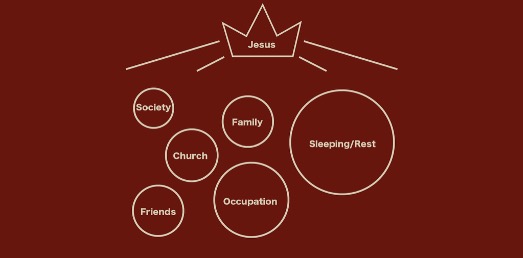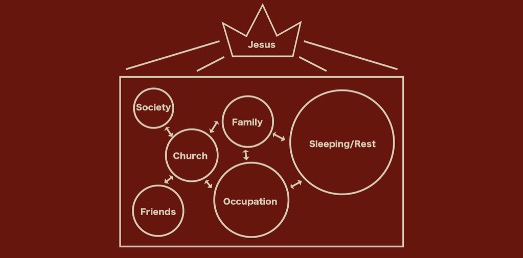Studying data science, running a photography business, studying part-time at Bible college, coordinating kids church, leading two Bible study groups and adding books to my Must Read pile—“I can handle that!” my overconfident, 20-year-old brain thought.
Then I crumpled. I was zapped of all my energy, my capacity was quartered, and I was left tired and discouraged. My body had finally caught up and forced me to stop.
Then God gifted me with many helpful friends, family members and mentors, and a fantastic psychologist. But as much as I would have loved them to, they didn’t provide me with a neat formula for getting back to all I wanted to do. Instead, they loved me, lifted my eyes to my Saviour, and slowly helped me untangle the busyness of my week.
Since then, I’ve gathered a number of reflections about living wisely in our frantic age as I seek to answer the question of how to “plan” my week (as much as we can plan under God’s sovereignty!) This article attempts to distil some of them—specifically, the twin poles of Jesus’ expansive lordship and our human finitude.
However, I don’t write this as a “guru” who has worked everything out; I’m a fellow traveller journeying towards our heavenly home. My prayer is that the principles I talk about will be general enough to be useful to you as you work out how to be faithful with the various responsibilities God has entrusted to you.
1. My life is not my own

The first consideration when it comes to “planning” my week is realising that it doesn’t belong to me. This runs contrary to what our culture says: it tells us that we belong to ourselves. We narrate our stories, we control our bodies and we determine our identities. As Stephen McAlpine articulates, the unconscious modern quest is to find our authentic self and express that to the world.1 But the Bible tells us the exact opposite: “You are not your own” writes the Apostle Paul. Because “you were bought with a price”, your life now has purpose, and that purpose is to “glorify God” (1 Cor 6:19-20).
Every aspect of our lives is lived between the bookends of Jesus’ death and resurrection (1 Cor 1, 15). The lordship of Jesus affects who we follow (1 Cor 3:1-4:21), how we use our bodies (1 Cor 5:1-13, 6:9-20), how we disagree (1 Cor 6:1-8), if and who we marry (1 Cor 7:1-40), what we eat (1 Cor 8:1-10:33), how we gather together (1 Cor 11:2-14:40), and what kinds of work to abound in (1 Cor 15:58, 16:10). The lordship of Jesus can’t be siloed into a select tithe of our lives; as Hudson Taylor beautifully captures it, “Christ is either Lord of all, or is not Lord at all!”2
Before saying “yes” or “no” to any decision, I need to be reminded that my life is not my own. Jesus is master over how I sleep, how I relate to my family, how much we budget for indoor plants, and the time we give to the widows at church. As the diagram above indicates, every facet of my life sits under Jesus.
Even though I am now married, sometimes I accidently default to fearless 20-year-old me and become tempted to book out every evening and then jam-pack any remaining spare time with reading. I’m even tempted to justify this as the godly thing to do! Yet in those moments, the lordship of Jesus makes me consider all that he has called me to. God has bound me to my wife Emily, and one of my responsibilities is to please her (1 Cor 7:33, 39).
This example is just of one of thousands of little decisions in which Jesus calls me to lay each facet of my life under his lordship and to be faithful with all he has entrusted to me. Each morning, we wake up not as autonomous masters, but humble servants. And so, in our own way, we need to pray,
Take my life and let it be
consecrated, Lord, to thee.
Take my moments and my days;
let them flow in endless praise.3
2. My life is finite and complicated

The second consideration when it comes to “planning” my week is the goodness of my limitations. The infinite scope of Jesus’ lordship can feel like an infinitely heavy burden. How can we ever do enough to please him? How can we ever justify sleeping when there are so many good works left undone?
The corrective to these questions is remembering that God is big and we are small. God is the master grower; we are his servants, who each play a small part in planting or watering (1 Cor 3:5-9). Christ is building his body; we are members who can’t do it alone (1 Cor 12:18-19).
In his book, You’re Only Human, Kelly Kapic helpfully articulates that God being infinite and humans being finite isn’t a problem to be overcome, but God’s good design. He calls us to stop “asking (or feeling that we should ask) for God’s forgiveness when we can’t do everything” and instead to “ask forgiveness for ever imagining we could!”4 Our finitude involves our limited time (168 hours per week), our need for sleep (~49 hours per week), our dependence on things outside of our control, and the fact that even when we choose to do something, we forfeit doing other things (a concept called “opportunity cost”). When I say yes to my cousin’s party, that means I can’t attend a conference on that same day. When I say yes to that additional job, that takes me away from time with family. In the diagram above, these competing choices and changes outside of our control are represented by the arrows between the spheres of responsibilities, bound within the box of our finitude.
These truths—that my life is finite and complicated—liberated me from the endless guilt of not reading enough. As my degree came to an end and the prospect of pursuing full-time ministry became more real, I felt like I had a duty to read and solve myriads of complicated theological questions. But when my psychologist asked, “Does Jesus expect you to have all these questions answered now?”, I suddenly realised the absurdity and impossibility of the burden I had placed on myself. God doesn’t expect me to know everything; he expects me to learn humbly each day.
Each evening, we hand over our unfinished jobs to God, and as we rest, we remember that God never rests, but continues to sustain all things in his good hands. This is why we can pray,
Thank you God for this day and all the good you allowed me to do. Thank you that I can entrust all the good left undone into your infinite hands. And thank you for this pillow that you have provided for me to rest now. Amen
3. My life needs wisdom in every season
As we make decisions and respond to things outside of our control, we need to hold onto the twin truths of Jesus’ infinite lordship and our finite capacity. On the one hand, we’re called to sacrifice everything to our Lord, dying every day for him and his gospel (1 Cor 9:19, 11:1, 15:31). On the other hand, we’re to accept and embrace the circumstances in which God has placed us, with all the limitations that entails (1 Cor 1:26-28, 7:17, 12:18).
Balancing these truths requires wisdom—especially in each new season as our lives change. Here are a few suggestions for applying wise thinking to your life:
- Try to map out your current responsibilities. What has God entrusted you with—as a finite human, church member, family member, friend, worker and citizen? Thank God for where he has currently placed you, and pray for contentment. I love Kaitlin Febles’s idea of praying through “a handwritten list of these roles … like daughter, sister, neighbor, student, and friend”.5
- When new opportunities come up for change (job opportunities, relationship changes, ministry needs), consider the new opportunities you will have as well as what you will forfeit. A promotion at work may allow you to support a new church planter financially, but may also mean less time at home with your loved ones.
- Consider the season you’re in. Each day, week, year and decade will bring different rhythms. There will be seasons of busyness—the birth of a child, a week of heightened mission, end-of-financial-year at work—and there will be seasons of quiet. Sometimes things will happen outside of our control and place us in a season we hadn’t planned for. For example, I think Bible study groups are one of the greatest things for Christians to be a part of. But there will be seasons when having a few months away from Bible Study to care for a family need will be the wise choice.
- Learn from those who have gone before. Find older saints at church and ask them about their stories and the decisions they made along the way. Ask them about their favourite hymns or Scriptures, and the wisdom these might shed. There are plenty of faithful believers that we ought to imitate as they have imitated Christ.
- Remember: your life is not your own. As Christians, sacrifice is not something we run from; it’s part of following our Lord, who sacrificed all for us. All our time, money, energy, relationships and opportunities have been entrusted to us by our kind master, and they are to be used for his glory (1 Cor 10:31). Because of Jesus, our lives are more than eating and drinking; they’re about turning away from sin, standing firm in our resurrection hope and making that known to others. We do this together, day by day, within our God-given capacity, giving ourselves in Jesus’ service. This task will never be in vain (1 Cor 15:32-34, 58).
After a few humble months of letting go of things, God slowly gifted me energy. I don’t think I’ll ever return to the capacity of my university days—and that’s probably a good thing! The last few years have seen me gradually learning lessons about living wisely. I’ve learned to see sleep as a God-given gift and necessity, and I’ve learned to say the hard words, “Sorry, I don’t have the capacity for this right now.” Now that I’ve started at theological college, I am trying to embrace this current season.
But I am very much still learning—still trying to preach the principles I’ve listed above to myself! I pray that you too will keep learning as you seek to be faithful in the many good things God has given you to do for the sake of his glory.
Ben Warren has completed his first year at Moore College.
Scripture quotations are from The ESV® Bible (The Holy Bible, English Standard Version®), copyright © 2001 by Crossway, a publishing ministry of Good News Publishers. Used by permission. All rights reserved.
Photo by Declan Sun on Unsplash
Endnotes
1 Stephen McAlpine, Futureproof (Surrey: Good Book Company, 2024), 31-77.
2 Hudson Taylor, “To Every Creature,” The Missionary Review of the World, 2, 1890, 107.
3 Frances Ridley Havergal, “Take My Life, and Let It Be,” 1874. hymnary.org/text/take_my_life_and_let_it_be.
4 Kelly M Kapic, You’re Only Human: How Your Limits Reflect God’s Design and Why That’s Good News (Grand Rapids, Michigan: Brazos Press, 2022), 18.
5 Kaitlin Febles, “How Should a Single Woman Manage Her Time?,” The Gospel Coalition, 15 August 2022, https://www.thegospelcoalition.org/article/single-manage-time/.


